Serving 1,898 students in grades 9-12, Kapolei High School ranks in the bottom 50% of all schools in Hawaii for overall test scores (math proficiency is bottom 50%, and reading proficiency is bottom 50%).
The percentage of students achieving proficiency in math is 25% (which is lower than the Hawaii state average of 38%). The percentage of students achieving proficiency in reading/language arts is 55% (which is higher than the Hawaii state average of 52%).
The student:teacher ratio of 15:1 is higher than the Hawaii state level of 14:1.
Minority enrollment is 94% of the student body (majority Hispanic and Asian), which is higher than the Hawaii state average of 89% (majority Asian and Hispanic).
Quick Stats (2025)
- Grades: 9-12
- Enrollment: 1,898 students
- Student:Teacher Ratio: 15:1
- Minority Enrollment: 94%
- Graduation Rate: 92% (Top 20% in HI)
- Overall Testing Rank: Bottom 50%
- Math Proficiency: 25% (Btm 50%)
- Reading Proficiency: 55% (Top 50%)
- Science Proficiency: 34% (Btm 50%)
- Source: National Center for Education Statistics (NCES), HI Dept. of Education
Top Rankings
Kapolei High School ranks among the top 20% of public schools in Hawaii for:
Category
Attribute
Graduation Rate
Diversity
School Overview
Kapolei High School's student population of 1,898 students has stayed relatively flat over five school years.
The teacher population of 127 teachers has stayed relatively flat over five school years.
Grades Offered
Grades 9-12
Total Students
1,898 students
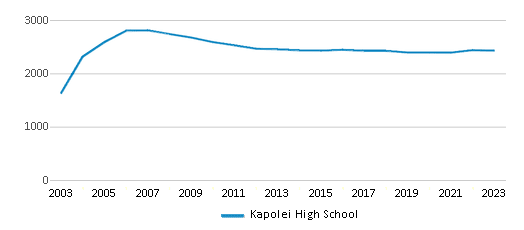
Gender %
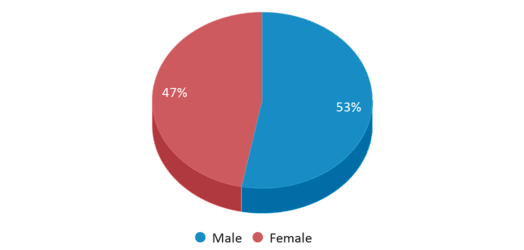
Total Classroom Teachers
127 teachers
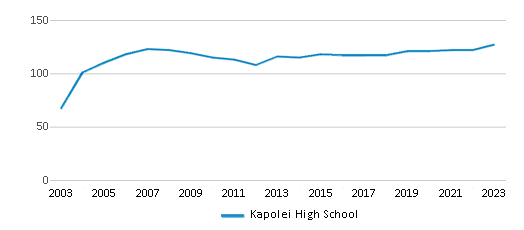
Students by Grade
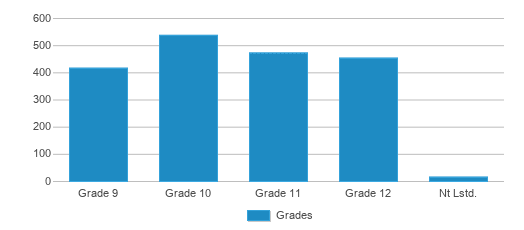
School Rankings
Kapolei High School ranks within the bottom 50% of all 292 schools in Hawaii (based off of combined math and reading proficiency testing data).
The diversity score of Kapolei High School is 0.79, which is less than the diversity score at state average of 0.80. The school's diversity has stayed relatively flat over five school years.
Overall Testing Rank
#161 out of 292 schools
(Bottom 50%)
(Bottom 50%)
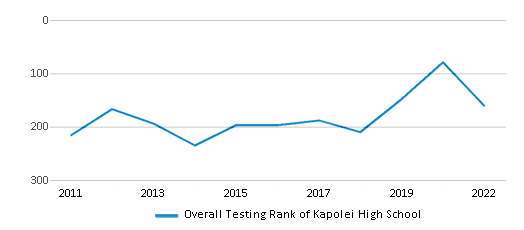
Math Test Scores (% Proficient)
25%
38%
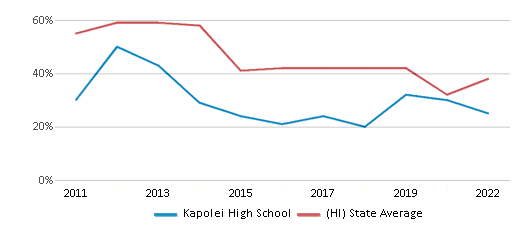
Reading/Language Arts Test Scores (% Proficient)
55%
52%
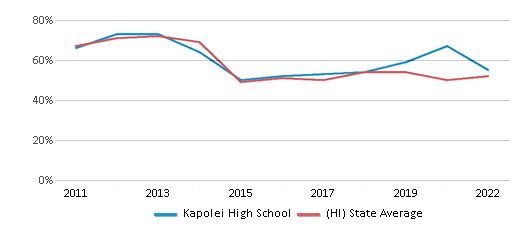
Science Test Scores (% Proficient)
34%
40%
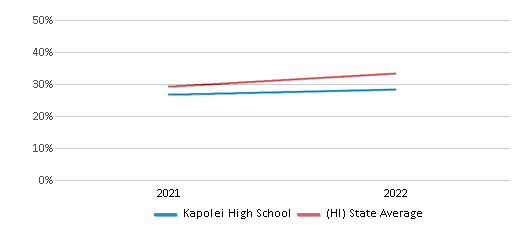
Student : Teacher Ratio
15:1
14:1
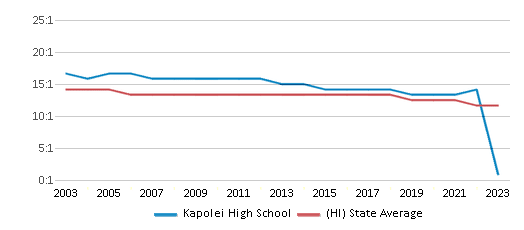
American Indian
n/a
n/a
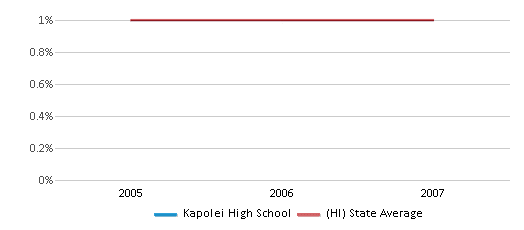
Asian
22%
24%
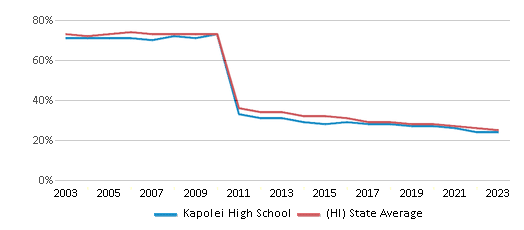
Hispanic
23%
19%
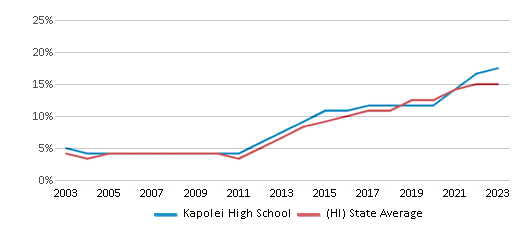
Black
2%
1%
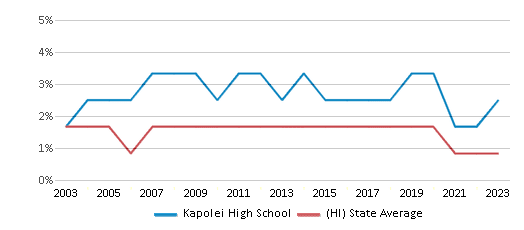
White
6%
11%
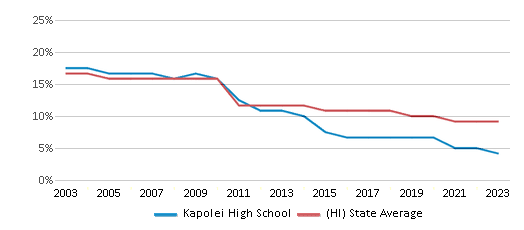
Hawaiian
28%
25%
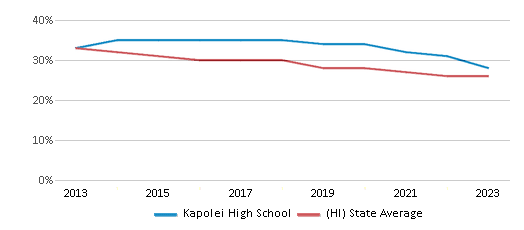
Two or more races
19%
20%
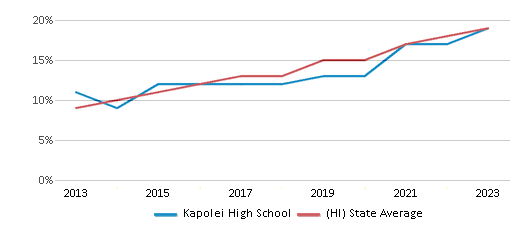
All Ethnic Groups
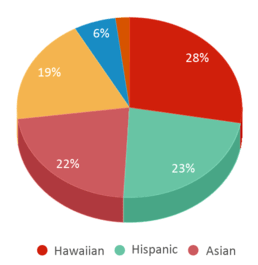
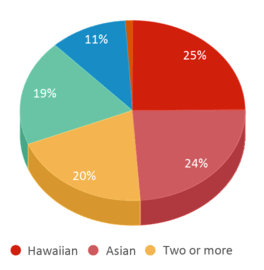
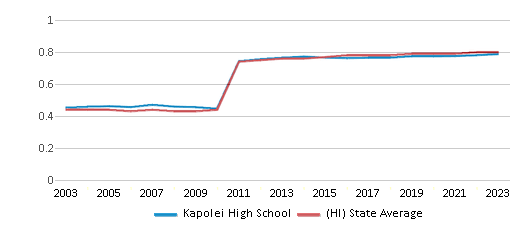
Graduation Rate
92%
86%
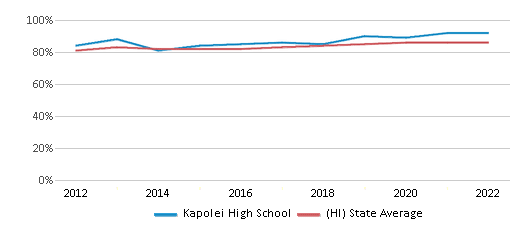
Participates in the National School Lunch Program (NSLP)
Yes
Eligible for Free Lunch
29%
37%
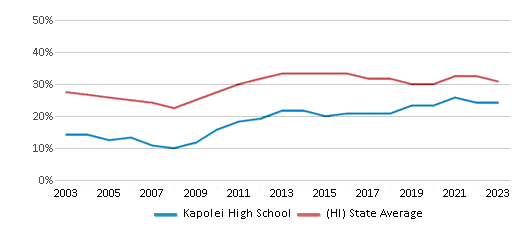
Eligible for Reduced Lunch
8%
9%
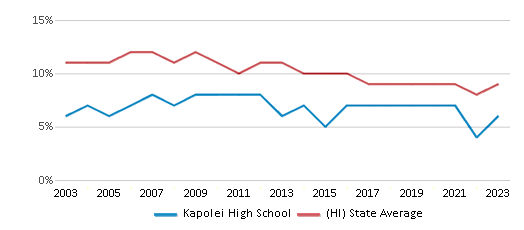
School Statewide Testing
School District Name
Source: National Center for Education Statistics (NCES), HI Dept. of Education
Profile last updated: 02/09/2025
Frequently Asked Questions
What is Kapolei High School's ranking?
Kapolei High School is ranked #161 out of 292 schools, which ranks it among the bottom 50% of public schools in Hawaii.
What schools are Kapolei High School often compared to?
Kapolei High Schoolis often viewed alongside schools like James Campbell High School, Waipahu High School by visitors of our site.
What percent of students have achieved state testing proficiency in math and reading?
25% of students have achieved math proficiency (compared to the 38% HI state average), while 55% of students have achieved reading proficiency (compared to the 52% HI state average).
What is the graduation rate of Kapolei High School?
The graduation rate of Kapolei High School is 92%, which is higher than the Hawaii state average of 86%.
How many students attend Kapolei High School?
1,898 students attend Kapolei High School.
What is the racial composition of the student body?
28% of Kapolei High School students are Hawaiian, 23% of students are Hispanic, 22% of students are Asian, 19% of students are Two or more races, 6% of students are White, and 2% of students are Black.
What is the student:teacher ratio of Kapolei High School?
Kapolei High School has a student ration of 15:1, which is higher than the Hawaii state average of 14:1.
What grades does Kapolei High School offer ?
Kapolei High School offers enrollment in grades 9-12
What school district is Kapolei High School part of?
Kapolei High School is part of Hawaii Department Of Education School District.
School Calendar
View the Kapolei High School yearly calendar below.
School Reviews
5 9/26/2007
I have one son that has graduated from Kapolei High School and one currently enrolled. He is a junior.I am very pleased with the opportunities afforded my children at this high school. Academically, my sons have had a number of very good teachers. Kapolei is a project-based school. In addition to the traditional, one subject courses, students are required to integrate the different subject areas into projects – much like the real world. Students are also taught reading strategies in all their classes (reading scores are fairly high – forgot the number) and there is a strong emphasis on writing in the upper grades.Kapolei High understands that young people need to feel that they belong. The school has adopted a “Rigor, Relevance, Relationships” structure. Students are placed in teams or academies for each of their 4 years and have the same teachers and students in their core classes for that particular year. (Students are placed in teams for their underclassmen years, then choose one of 8? academies for their junior and senior years.)
Because of this design, my sons have developed close relationships with both their peers and many of their teachers. My oldest son has maintained many of those relationships and returns to the high school to help out and mentor other students. This is not a rare occurrence here. Quite a few graduates return to help out at the school or to talk to students about their post-high school experiences.In the younger grades, teaming can sometimes have its downsides as one member may not do his fair share of the work and another student may do it to save his own grade. In the academy my sons have been in, students are encouraged to be assertive about addressing the “non-working” student directly and encouraging him to complete his part. I heard that one group actually called the mom of one of the non-working students.The school has a multitude of extracurricular activities, ranging from sports (~ 20 different sports at a range of levels), cultural clubs, dance clubs, service clubs, etc. The majority of the adults leading these programs are teachers at the high school. I’ve noticed they’ve developed strong and positive relationships with their students.My oldest son was a learning disabled SPED student. He was fully integrated into the regular ed classroom and was given the same opportunities as other students, with modifications for his handicap. By his Senior year he had earned the right to participate in both national and international science competitions and programs outside of Hawaii. Other students from this school have competed in national exhibitions and competitions in art, graphics, music, and video production.As a SPED parent, the entire 4 years did not always run smoothly. Each concern I had was addressed with modifications to my satisfaction, but its implementation was not always to my satisfaction by all his teachers - but most did well. His SPED Care Coordinator, did a fantastic job helping him through high school without enabling him. I appreciated that.
KHS is a new school (2000) composed of 4 “neighborhoods” or large buildings that house students. There are handicap elevators, a library, cybercafé, cafeteria, kiosks, a gym, weightroom, training room with a certified trainer, locker rooms, football and regulation soccer field, softball and baseball fields, bandroom, and most important – air conditioning. It’s a beautiful campus!As for parent involvement, this past week I attended my son’s “Academy Parent Night.” There were over 120 people in attendance. Another academy was concurrently having their parent night. Again, over 120 people attended. Each team and academy has their own Parent Night. I’ve heard they are all pretty well attended.When both of my boys entered KHS, they were self-centered teenagers. My oldest has learned how to be apart of a working community and the personal and social skills he had acquired at Kapolei High School has continued to be an asset for him. Most of his teams/academy had set very high expectations for quality work and I noticed that he has adopted that expectation. As for my Junior son, I am very pleased with his reading, writing, math, oral communication, and social skills.It has been my experience that KHS has a lot to offer its students. As with any large (~2,300) campus, there will be a range that exists. As a parent, I had occasional frustrations, but, by and large, it has been a very positive experience. When I reflect back on what my boys were like when they entered high school and how they have grown into responsible and capable young men, I don’t think I could have chosen a better high school for them to attend.
Review Kapolei High School. Reviews should be a few sentences in length. Please include any comments on:
- Quality of academic programs, teachers, and facilities
- Availability of music, art, sports and other extracurricular activities
Recent Articles

What Is A Charter School?
Explore the world of charter schools in this comprehensive guide. Learn about their history, how they operate, and the pros and cons of this educational innovation. Discover key facts about charter schools, including admission policies, demographics, and funding, as well as what to look for when considering a charter school for your child.

10 Reasons Why High School Sports Benefit Students
Discover the 10 compelling reasons why high school sports are beneficial for students. This comprehensive article explores how athletics enhance academic performance, foster personal growth, and develop crucial life skills. From improved fitness and time management to leadership development and community representation, learn why participating in high school sports can be a game-changer for students' overall success and well-being.

February 05, 2025
Understanding the U.S. Department of Education: Structure, Impact, and EvolutionWe explore how the Department of Education shapes American education, from its cabinet-level leadership to its impact on millions of students, written for general audiences seeking clarity on this vital institution.









